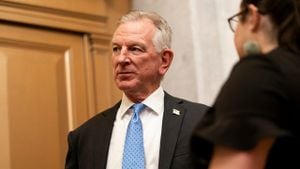With the dust barely settling from his surprising electoral success, President-elect Donald Trump is swiftly advancing his agenda of reshaping his administration. This time around, he’s inviting back some of his staunchest allies as he attempts to gather strength heading toward his inauguration. Central to this initiative is the announcement of his Cabinet picks, which has generated mixed reactions from seasoned Senate Republicans.
One of Trump's standout choices was the nomination of Representative Matt Gaetz from Florida for the position of Attorney General, which raised eyebrows not only for Gaetz's previous controversial history but also due to the precarious path he may face for confirmation. Many Senate Republicans reacted with astonishment to Gaetz’s selection, hinting at potential hurdles as the nomination process kicks off. Gaetz, who has already submitted his resignation from the House, is set to take the helm of the very department Trump has criticized heavily during his first term due to several legal battles.
Interestingly, Gaetz's nomination has reignited discussions about the investigation he faced for alleged sexual misconduct. Although the Justice Department concluded its probe last year without filing charges against him, the shadow of these allegations looms as he steps forward to assume perhaps the most powerful legal office – one directly overseeing federal law enforcement. Commenting on his appointment, Gaetz has already stated, “I have never, ever paid for sex,” trying to assure his constituents and the Senate of his integrity.
Moving beyond personnel choices, Trump's Cabinet selections also included Senator Marco Rubio as Secretary of State and Tulsi Gabbard, the former Democratic congresswoman who became one of his faithful supporters, as Director of National Intelligence. Each pick signals Trump's commitment to surround himself with allies rather than appointing moderates, reflecting the confidence he feels after his recent victory.
The Republican Party's sweep has secured majority control over the House, fueling Trump's drive to implement his legislative agenda. This has created what's referred to as a 'governing trifecta' – unifying the executive and legislative branches under Republican leadership ready to push through their policy goals. House Republicans welcomed Trump's return with open arms, celebrating his incumbency and expressing optimism toward their collective future as they gear up for the legislative battles to come.
Contrarily, Senate Democrats now face challenging times as they work to confirm Biden’s judicial nominees before they lose majority control. With Trump warning Republicans against allowing any confirmations, the stakes are high. If Biden's nominees fail to make it through, it will hand Trump the opportunity to fill those vacancies with more conservative judges, reinforcing the Republican influence over the courts.
Trump's approach seems to be assertive as he aims to reshape the government’s fabric by appointing allies who echo his agenda—a move both radical and strategic. Notably, this shift aims to lessen the bureaucratic powers of current agencies. Trump is also eyeing potential action against the likes of the DOJ and FBI, as suggested by Gaetz, who implied they should be abolished if they don't comply with the new administration's directives.
On social media, enthusiasm for Trump functions alongside significant apprehension from opposition circles. Many Americans are left to wonder what the ramifications of these appointments and impending laws will be, hitched to the clarion call of his administration’s transparency. Adding to this blend of hopes and uncertainties, the anticipation surrounding the Trump transition is also markedly amplified by the introduction of tech billionaire Elon Musk, who is rumored to be playing a pivotal role within Trump's newfound leadership circle.
Further complicity has emerged through Trump's relationship with personalities like Musk, who alongside others, has been entrusted with the task of heading efforts to streamline government operations, echoing Trump's broader intentions of reducing governmental reach and influence.
The overall atmosphere is charged with anticipation as the establishment of Trump’s administration begins to take shape. His selections have evoked various responses, consolidations, dissensions, and above all, have thrown the political arena back onto the high-stakes game of power dynamics.
Notably, the recent Supreme Court appointments made during Trump's initial term also hint at deepening ideological shifts. Having already filled the courts with numerous judges who reflect more conservative philosophies, the continuing trend stands to amplify Trump's influence post-inauguration. The Democratic response will be telling, as they strategize how to navigate upcoming challenges under the new political framework.
What remains clear, as the nation braces for Trump's second act, is the unmistakable fervor to establish dominance within the Republican machine and across the government. For many, the message is simple: President Trump's return signifies not just continuity, but a recalibration toward the policies he deems fit for America.
Fasten your seatbelts as this political rollercoaster continues to twist and turn, delivering fresh challenge after challenge, and with it, enticing drama bound to grip the nation's attention for months on end.



